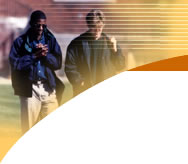

Student Questions
|
Q. I have a disability. Do I have to meet the same requirements for admissions as students who do not have a disability? A. Yes. According to the Americans with Disabilities Act of 1990 and Section 504 of the Rehabilitation Act of 1973, colleges do not have to lower their admissions standards for students with disabilities. Q. What documentation do I have to provide to prove that I have a disability? A. You must have a statement from an appropriately licensed and certified person who is qualified to diagnose your disability and to provide a statement about its impact on your ability to function as a student in college. Q. I have an IEP from high school. Is that adequate documentation? A. No. The IEP from high school is identifies the services the high school agreed to provide. The high school IEP does not document the disability or identify the impact on college education. A recent evaluation from high school's school psychologist or other licensed professional may be used for documentation Q. Where do I send documentation of my disability? A. Send documentation to the Disability Services Office, 120 South Wing, Buffalo State College, 1300 Elmwood Avenue, Buffalo, NY 14222-1095 after you have been admitted to the college. Do NOT send it to the Admissions office. Q. Are the residence halls accessible for students with disabilities? A. Yes. If you need accommodations in the residence halls, contact the Residence Life Office. Q. I cannot take a full-time load of classes because of my disability. Can I get financial aid as a part-time student with a disability? A. Yes, if attending school part-time is necessary because of your disability. Q. What is the institution's responsibility to international students? A. International students are entitled to the same protection from nondiscrimination on the basis of disability as are US students. Q. Does the institution have to provide accommodations for a non-degree, non-matriculated, and continuing education program students? A. Yes. All students with a disability who are enrolled at the college including non-degree, non-matriculated, or continuing education program students must be provided accommodations. Faculty Questions
Q. A student has told me that she/he has a disability. What do I do? A. If the student has provided you with a formal letter requesting accommodations, then follow the request as asked. If you have questions, contact Marianne Savino at 878-4500. If the student has not provided you with the formal letter, do NOT provide accommodations without conferring with the Disability Services Office. Q. A student has requested more time on exams. How much more time does he get? A. The amount of time given depends on the student's disability and the documentation. Q. Providing the requested accommodations would be a hardship in my class. What options do I have? A. Contact the Disability Services Office to see if there are other ways to meet the student's needs. Q. The student does not appear to have a disability. How do I know that the student really does have a disability? A. Many disabilities are hidden; we do not have to see a disability for it to be real. The Disability Services Office has reviewed the documentation provided by an appropriately licensed professional qualified to evaluate the disability and has these records on file. Q. Do I have the right to see the student's documentation? A. Faculty cannot review the documentation. This protects the confidentiality of the student. Q. The student is disruptive and talks during the class. Can I ask him to withdraw from my class? A. No. However, the student must meet the Students' Code for Freedoms, Rights, and Responsibilities. Q. A student with a disability is habitually late. Must I accommodate this? A. No, unless there has been a prior arrangement based on the student's needs. Q. The student with a disability always turns in his papers in late. Do I penalize him? A. Yes. The student must meet the same standards as other students, including deadlines, unless prior arrangements have been made. |
Eligibility for Services | Prospective Students | Current Students | Faculty and Staff
Policy on Disability | Resources | FAQ's | Glossary